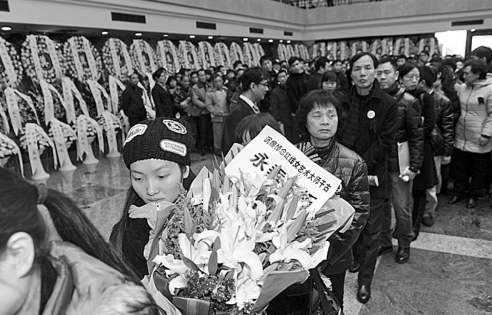
MO WEINONG/CHINA DAILY
More than 3,000 people attend the farewell ceremony.
An enduring inspiration
Hong discovered Ou's potential as a Cantonese opera star after watching Guangxi TV Station's broadcast of the mid-autumn festival gala. She went to Guangxi in person for Ou's job transfer.
"I was surprised that Hong Xiannu, such a notable, respected character, would come for me as a young, unknown actor at that time. I'm grateful that Hong Xiannu took me to a bigger stage," says Ou, who later became the country's top Cantonese actor for both musical and kung fu plays and the director of Guangzhou Red Bean Cantonese Opera Troupe.
"I will inherit my teacher's spirit of always endeavoring to do better and holding art and the stage in awe and veneration," Ou says.
Hong required Ou to read through the Turbulent Stream trilogy by Chinese writer Ba Jin (1904-2005) as she did when they were producing an opera based on the first book of the trilogy, The Family.
"I've learned from Hong Xiannu that acting is much more than memorizing the script. It requires in-depth knowledge about the author, the characters and the story's social background," Ou says.
She also set a good example for Cantonese opera artists to keep updated on the latest social changes by reading eight to 10 newspapers every day, he adds.
In Ou's eyes, Hong was both a strict teacher and a loving mother. When Ou was busy staging shows at home and abroad, Hong took care of his son, treating him as her own grandson. The good friends - despite the great difference in age - dined together the day before Hong's sudden departure.
Hong joined Ma Sze-tsang's Cantonese opera troupe traveling across Guangdong province and Guangxi during the War of Resistance against Japanese Aggression (1937-45), to boost the army's and people's morale and raise money for the resistance.
She started her career on the big screen in 1947 in Hong Kong and starred in more than 90 movies in the following eight years.
It was surprising when the Cantonese opera and movie star gave up her fame in Hong Kong and decided to return to the mainland in 1955 upon then premier Zhou Enlai's invitation.
Hong offered great support to the development of Cantonese opera in Hong Kong, although she left. For example, she attended the reopening ceremony of Hong Kong's Sunbeam Theater and sang Praise of Lychee last May at the age of 88.
The Cantonese opera industry, the media and the public have all been discussing the future development of the art after the banner bearer's death. However, Yu hopes that the discussion on rejuvenating the industry will continue.
"Hong Xiannu passed away with concerns about the shortage of new plays closely related to contemporary society and young talents, especially scriptwriters. Solving these problems requires our long-term efforts," says Yu from the Guangdong Cantonese Opera Theater.
"Hong Xiannu had been working hard to bring forth new ideas to the traditional art to make it appealing to young audiences."
Banners that read "Her life belongs to art" and "Her art belongs to people" hung from the two sides of Hong's coffin at the funeral.
"This is the most apt description of my mother's life," Ma Dingchang, Hong's son, says.
"Now she can rest. I believe she is consoled to have received condolences from the Party, the country and the people."
Contact the writer at xujingxi@chinadaily.com.cn.
We recommend:
